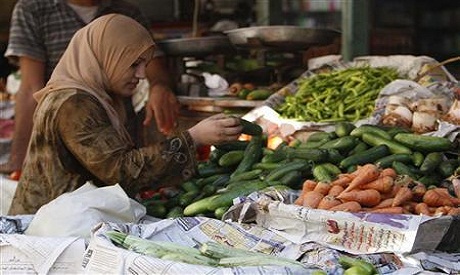
Inflation bites hard due to the rise in food prices
Growth forecasts for Egypt by the International Monetary Fund (IMF) are less optimistic than those of the government. However, an IMF official on Sunday described Egypt's growth as good by global standards.
The IMF predicts a growth rate of 5.8 per cent for the current year, rising to 6 per cent the next year. These figures are less optimistic than the government's of 6.2 and 8 per cent respectively. Alan MacArthur, IMF mission chief for Egypt, declined to comment on this disparity.
The Egyptian economy is, however, facing many challenges in the post crisis period, according to two IMF officials who addressed a round table discussion on the subject organized by the Egyptian Center for Economic studies (ECES).
Reducing inflation, public debt and the budget deficit are among the main challenges for the Egyptian economy according to Ratna Sahay, deputy director of the IMF’s Middle East and Central Asia department.
But those are not the only challenges. “I was expecting to hear that one of the challenges is income distribution,” said Mohamed Taymour, chairman of Pharos investment bank and board member of the ECES.
“Bad income distribution is a normal phenomenon that accompanies growth. But in Egypt the gap has reached a level that can create social tensions and bring down the whole process,” he added.
The IMF representatives agreed with Taymour. Egypt’s imbalanced income distribution can be reflected in the high rate of unemployment. “9 per cent is a very high level,” said MacArthur.
Sahay highlighted that there will be millions of new job seekers in the next 10 years. Added to the existing 2.4 m unemployed, Egypt will need to create around 9.4 million jobs.
“GDP has to grow 7 per cent to create jobs for the new comers. But to create jobs for everybody, growth rate should be at 10 per cent,” Sahay said.
This, she believes, is achievable since Egypt created 2.5 m jobs between 2005 and 2007.
However, she failed to mention that these jobs are for the most part low-paid and menial, as stated by the International Labor Organization (ILO). In 2009, the ILO highlighted that the phenomenon of the working poor was becoming more widespread in Egypt.
Another factor weighing on income distribution is high inflation that acts as a tax on the poor.
Inflation bites hard due to the rise in food prices. This has an evident effect on the poorest as was mentioned during the round table.
Inflation also affects growth. “With high inflation it will be hard to sustain growth that is based on local consumption,” said Sahay, warning that investors hold back when high inflation persists.
To overcome the challenges, the IMF advises, among other things, increasing exports, improving competitiveness, creating jobs and cutting inflation as well as moving towards fiscal consolidation. This entails reducing government deficit and cutting domestic debt.
To reduce the deficit, the IMF suggests cutting subsidies that many people rely on and increasing tax revenue by replacing sales tax with value added tax (VAT). “Subsidies represent 6 per cent of GDP, this is huge. They are not benefiting the poorest. If these sums are redirected to the most vulnerable, there will be a better income distribution,” said Sahay.
Short link: